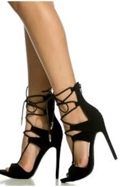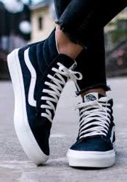Different foot structures and different types of foot pain warrant different recommendations for the types of shoes that are most beneficial for a particular person. Here are some of my suggestions in this regard:
Flat feet: people with flat feet have a foot structure that rolls inward more than is normal, which is what we call excessive pronation. Some shoes are actually made for “pronators” or people who pronate excessively. There is a whole spectrum of flat feet, ranging from a mild flat foot with a slightly decreased arch, to a severe flat foot which has no arch height at all. Shoes made for people with flat feet typically have extra support in the arch area.
High arches: people with high arched feet typically have more pressure on their heel area and on the balls of their feet when walking/standing. Those with high arches also may not absorb shock as well, and therefore need a shoe that offers sufficient cushion for their foot structure.
Diabetes: people who are diabetic should have high quality, supportive, and proper fitting shoes. It’s particularly important to have shoes which are roomy enough in the toe box, which is the area where the toes sit. People with diabetes can develop hammertoe deformities, which in turn can lead to wounds or sores on the toes from rubbing against shoes. Diabetics who have Medicare may be able to receive free shoes and special insoles through the diabetic therapeutic foot wear program, if they meet qualifying criteria. Call our office at 586-298-1585 to find out more about this program.
Heel pain: while there are many causes of heel pain, the most common one is plantar fasciitis. Those with this type of heel pain should have shoes with excellent arch support. It’s also important to wear shoes at all times, including around the house, until the plantar fasciitis resolves.
Big toe joint pain/stiffness: stiffness or pain in the big toe joint often indicates arthritis. Arthritis in the big toe joint is a progressive condition, just as it is at any other joint in the body, so it’s particularly important to try to minimize the stress on this joint. This can be accomplished by wearing very stiff-soled shoes, which flex only minimally in the toe area. It’s also a good idea for people with big toe joint arthritis to wear shoes as much as possible, even around the house, as this can help to slow the progression of the arthritis.
Nerve pain: symptoms such as burning, tingling, or numbness can indicate that there is a nerve problem in the foot or elsewhere in the body. There are many types of and causes of nerve pain. If these symptoms occur in the ball of the foot, they may be from a nerve problem called a neuroma. Neuroma pain is often improved or alleviated with shoes without a heel, and shoes which have good support (and sometimes even padding) in the ball of the foot area. Shoes with an adequate width are also critical, as a shoe which is too narrow compresses the foot and therefore can aggravate or even cause nerve problems.
Ingrown nails: this painful condition can actually be caused by ill-fitting shoes in some cases. Children often outgrow their shoes prior to their parents being aware that they have done so, and many adults assume that they are the same shoe size as they were when their feet stopped growing. Conditions such as pregnancy can also change a person’s shoe size, often permanently.
Orthotics: are special insoles that go into the shoes. They are used for a wide variety of foot problems and for many types of foot pain. Orthotics function to redistribute the pressure on the bottom of the foot, and to place the foot in the proper position that research suggests is the best way for the feet to function. Orthotics are like eyeglasses in this regard, where they allow the feet to function in the most optimal manner.
It’s important to remember that foot pain is not normal, and that it should NOT prevent you from being able to live an active, healthy, enjoyable life. For evaluation of your foot pain and individual foot structure, call us at 586-298-1585. We look forward to helping you!




Pingback: What you need to know about shoes - Dr. Stephanie Carollo Foot and Ankle Care